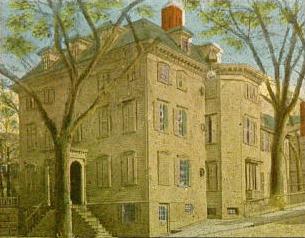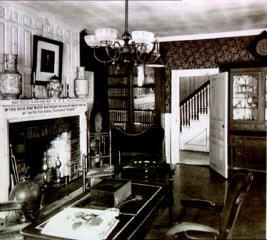Gaspee Virtual Archives Virtual Archives |
| A
Night at
Sabin's Inn by Hazel
Wade Kennedy
|
|
In the year 1772 there was an inn in Providence, Rhode Island located at what is now the, corner of South Main and Planet Streets. This hostelry was known as Sabin's Tavern and was presided over by James Sabin, a regularly licensed innkeeper. It was a famous place of resort in those days for merchants and professional men because the landlord was esteemed by all who knew him and his house was distinguished for its excellence and its hospitality.
Were it not for the events which transpired within this house on the evening of the ninth of June, 1772, Sabin's Tavern would never have attracted much attention and would have been remembered only as a favorite resort of bygone days. Its location on the main road and opposite Fenner's Wharf, from which a regular packet sailed to Newport and New York, lent it some prominence, but its selection as the rendezvous for the daring party that burnt the Gaspee made the old place historic. It was the custom in colonial days in Rhode Island for the lawyers at at the concluding of filing pleas at the different terms of the courts to meet at some popular resort and together spend the evening. These gatherings were usually held at some tavern in the town, where they passed the time well into the night.
On Tuesday evening in the month of June 1772 in one of the spacious rooms at Sabin's Inn Tavern there was a small but select party consisting of John Andrews, Judge of the court of vice-admiralty, John Cole, Daniel Hitchcock and George Brown, gentlemen of the bar. They had attended to their legal duties which had brought them to town and now sought the comfort and cheer of Sabin's Tavern. Early in the evening, after supper, between 7 and 8 o'clock, these gentlemen were disturbed by a loud noise in the street near the house attended by the beating of a drum. Such sounds were not unusual, but its long continuation attracted their attention, and Mr. Cole, going to the window, pulled back the shutters and saw several people collected together in the street. Turning to his companions he in inquired if they knew the occasion of all this excitement. One of the party remarked that he hoped they were up to no mischief to which Cole remarked, "I believe not. If they were on such a design they "Would not be so public." Several times during the evening, up until 10 o'clock, the beating of the drum and the voices in the street aroused some curiosity in the minds of these men and from time to time one of the party crossed the room and looked out and inquired the cause of so much commotion. But each time the reply was to the effect that it was some boys beating a drum, "that it had been training day and the people were breaking up their frolic." During this time landlord Sabin flitting busily about the tavern attending to their wants and now and then stopping with them for a moment to chat. Thus the evening passed until long after midnight when this little party broke up. All left the tavern into the darkness of the night and went to their lodgings and to bed. While these gentlemen are enjoying themselves in this., room, another room of the tavern, the south-east room, there is another much larger party and it has a strange and unusual appearance. From time to time the door opens and new comers appear. They are all armed with guns, powder horns and cartridge boxes slung over their shoulders. By 9 o'clock the room is full of people and by the dim light of the lamp on the mantelpiece the faces of many of the shipmasters, merchants and other substantial men of the town can be distinguished. Around the fireplace men are melting lead and running bullets, others are making cartridges and looking over their guns. There is no loud conversation. Each man is busy preparing for some unusual undertaking and the sound of the drum outside in the street does not disturb them nor does it awaken any curiosity in their minds as to its significance. The kitchen clock indicates the hour of 10 and with a few whispered orders from one of the party the crowd in the southeast room quietly file out of the tavern, crosses the street to Fenner's wharf and one by one drop into some long boats. Around the wharf is a number of men and boys watching the strange proceedings. There is a low command and then the boats push off and are soon lost in the darkness. Sabin's Tavern, at the head of the wharf, stands dark and gloomy. Only a streak of light shine through the shutters in the room where those four gentlemen sit, totally unaware of the strange maneuvers going on about them. The next morning Judge Andrews arose early. While putting on his clothes he was surprised to hear some one in the street near his window say to another that the schooner was burnt. He opened the window and on the other side of the street three men were talking. From them, for the first time, he learned the story of the night's work. It was not long before all of his companions heard the thrilling news and then there came floating back upon their memories the crowd and noise in the street, the rattle of the drum and the meaning of all this was plain enough. Doubtless they congratulated themselves on being ignorant of what was going on within the house that night. The Gaspee had been destroyed, but that was not the end of the troubles. Posters were put up in conspicuous places and circulated freely throughout the colony offering a reward for information which would bring those engaged in the affair to justice. Then came the King's commissioners to inquire into the whole matter. In due time Landlord Sabin and the four gentlemen, comprising the little dinner party on that June evening, were summoned to Newport to give their testimony about what they knew of the burning of the Gaspee. All went but Mr. Sabin who sent a letter instead dated January 19, 1773. In it he stated he would be unable to attend because he was insolvent debtor and his person would be subject to arrest by someone or another of his creditors, also that his health had been on the decline in the past two months and it would be dangerous for him to leave his house. He also explained that on the night of June 9th he was employed at his house attending company, who were John Andrews, Judge of the court of vice-admiralty, John Cole, Daniel Hitchcock and George Brown, gentlemen of the bar, who did not leave until 2 o'clock in the morning. The names of everyone of this dinner party were known to the King's commissioners and each of them had to give a strict account of his whereabouts and actions that evening, but not one of the crowd in the south-east room, fully aware of the affair from beginning to end, was ever summoned or ever testified before the court of inquiry. So much secrecy was maintained that the names of only a dozen or so of this "crowd" were ever known. |
| Go to History of Sabin Tavern at Gaspee.com | Back to Top | Back to Gaspee Virtual Archives |

